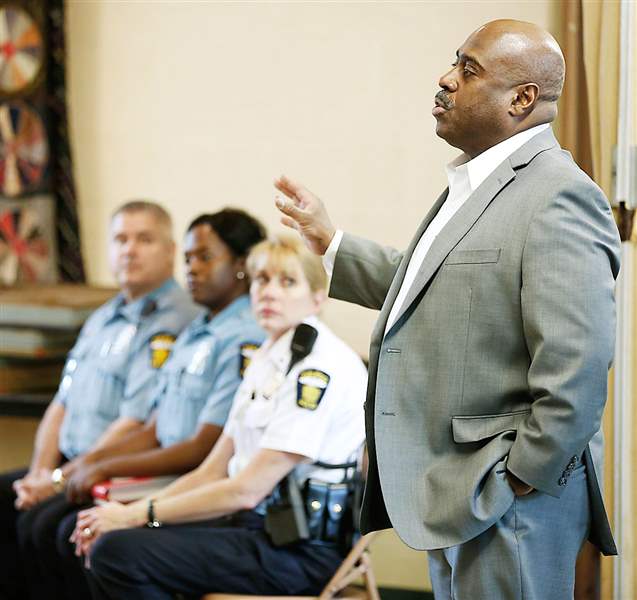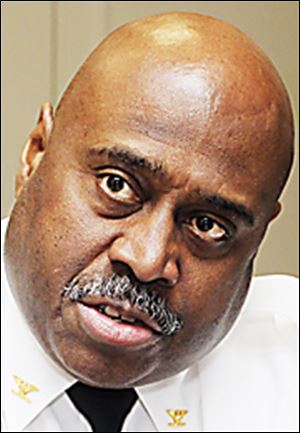
BATTLE LINES: GANGS OF TOLEDO
Refuting mayor, Diggs states it’s ‘ludicrous’ to deny gangs in Toledo
5/1/2013
Slug: CTY tpdmeet01p The Blade/Jeremy Wadsworth Caption: Toledo Police Chief Derrick Diggs speaks during a meeting Tuesday, 04/30/13, at Monroe Street United Methodist Church in toledo, Ohio. From April 12th to April 21st, the Toledo Police Department conducted a target enforcement action in central Toledo that resulted in 136 arrests. The community meeting was a discussion of a joint Initiative between TPD, the Department of Inspections, the Lucas County Land Bank, and Toledo Neighborhoods Block Watch to improve the quality of life in that same neighborhood.
THE BLADE/JEREMY WADSWORTH
Buy This Image

Police Chief Derrick Diggs says gang issues are in every major U.S. city.
A day after Toledo Mayor Mike Bell told The Blade that Toledo doesn’t have a gang problem, the city’s police chief, Derrick Diggs, said in a radio interview that it would be “ludicrous” to say there is no gang problem in the city.
“We’re a city of 300,000 people. For me to sit here and tell you we don’t have problems with gangs would be ludicrous. Gang problems are in every major city in the United States,” Chief Diggs said in a live interview on WSPD-AM, 1370 on Tuesday. He went on: “I would like to believe, and I strongly believe, that our problem with gangs is no worse — probably even a lot better — than comparable cities our size.”
Mr. Bell, in an interview with The Blade on Monday, at first said Toledo does not have a gang problem but clarified that it is “no different than any other metropolitan city.”
“It’s a gang problem when someone actually creates an action, but up until then it’s just a group of people meeting,” he said.
Story: Toledo's gangs not very different from others
Storify: Discuss the series on social media with #toledogangs
Map: Interactive Toledo gang map
About the series:
Battle Lines: The Gangs of Toledo
Videos: Battle Lines: The Gangs of Toledo
Reporter: Taylor Dungjen
Photographer: Amy E. Voigt
Getting the gang story: How 2 Blade staffers overcame obstacles to cover Toledo's gangs
In 2012, 7 of Toledo’s 36 homicides were gang-related, down from 2011 when 13 of 37 homicides were gang-related. Chief Diggs said while the perception is that gang violence is the leading cause of homicides in the city, the leading cause in 2012 was domestic violence. Overall, he said crime fell 17 percent in Toledo last year, and so far in 2013 crime is running 26 percent behind 2012.
“We’re still going to be continuing to look at various ways to handle the gang situation. Statistics don’t lie. We have reduced crime in this community, and crime is continuing to be reduced in this community,” the chief said, citing the Toledo Community Initiative to Reduce Violence as evidence of the department’s focus on gang and gun violence.
“As long as I’m chief of police we will have an aggressive, firm, and focused response to gun violence and gang violence in this community,” he said.
The Toledo Community Initiative to Reduce Violence brings pressure and enforcement down on a gang when one of its members engages in violence.
Chief Diggs and Toledo Police Capt. Brad Weis cited several approaches they said have been effective in undermining gangs during the 15-minute interview with morning host Fred LeFebvre. Those include a program requiring juvenile offenders to sign a contract and, if they comply with it, have their juvenile court record wiped out.
“Putting them in [the juvenile justice system] originally, it probably helps them get into gangs and gets to the point where it’s looked upon as status so we try to avoid that. We do everything we can to keep kids away from the criminal justice system. We use various hooks to get them to do the positive things that we need them to do,” Chief Diggs said.
The chief cited Mountain Mentors, an established volunteer program under which officers and others take disadvantaged youth on two-week camping trips, and the Police Athletic League, which requires participants to stay in school and teaches self-confidence, self-restraint, and to resist gang pressures.
“After being in our PAL program awhile, kids who were in rival gangs turn out to be best friends,” he said. “This is my second year as chief of police, and these are the things we’re focusing very strongly on, which I call community engagement,” he said. He became chief on Oct. 21, 2011.
Chief Diggs declined to answer questions about a four-day investigative series on gang violence by The Blade at a meeting Tuesday night hosted by several city departments and organizations, meant to update residents on a recent law enforcement initiative in the central Toledo area bounded by Monroe and Dorr streets, and North Detroit and Upton avenues.
“I’m not going to comment on it,” he told a reporter.
Chief Diggs said he was not in a gang as a youth because it was not something his mother, a single parent, would have tolerated.
“I had very strong parental supervision, and we had very strong rules in my household. I had to go to school and be successful in school. I was involved in athletics. We weren’t allowed to divert from the positive things you have to do as a young child,” he said.
He disagreed that youth get into gangs because the household has no father.
“I think that’s a personal slap in the face of all the single mothers who raised kids successfully, sometimes multiple kids successfully, and they are now productive in this community and elsewhere. I was raised by a single mother; we had strict rules. I’m pretty sure she’s rolling over in her grave when she hears something like that,” he said.
Staff writer Kelly McLendon contributed to this report.
Contact Tom Troy at: tomtroy@theblade.com, or 419-724-6058.